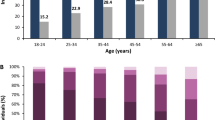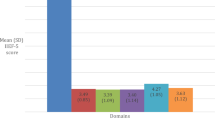Abstract
The objective of the study was to apply an illness representations framework to examine patients' beliefs about erectile dysfunction (ED) and the association between those beliefs and reported quality of life. A total of 41 patients attending two secondary care clinics at a teaching hospital completed questionnaires examining quality of life, sexual functioning, illness representations (cause, time-line, coherence, consequences, cure, control and emotion) and perceptions of masculinity. Masculinity, sexual function, emotions and beliefs about consequences were found to be significantly correlated with quality of life. Multiple regression analysis revealed a model that accounted for almost 35% of the variance in quality of life of ED patients. The strongest predictor of higher quality of life was better sexual functioning (β=−0.342, P<0.05) followed by more positive beliefs about the effects of ED on masculinity (β=0.323, P<0.05). The results suggest that when assessing the quality of life of men with ED, patients' illness representations should be considered along with their level of sexual functioning and the effects of ED on masculinity. Patients may benefit from an intervention programme that includes an educational component, thereby providing patients with more information about treatment options and available support.
This is a preview of subscription content, access via your institution
Access options
Subscribe to this journal
Receive 8 print issues and online access
$259.00 per year
only $32.38 per issue
Buy this article
- Purchase on Springer Link
- Instant access to full article PDF
Prices may be subject to local taxes which are calculated during checkout
Similar content being viewed by others
References
Aytac IA, Araujo ABJ, Kleinman KP, McKindlay JB . Socio-economic factors and incidence of ED: finding of the longitudinal Massachusetts Male Aging Study. Social Sci Med 2000; 51: 771–778.
Morgentaler A . Male impotence. Lancet 1999; 354: 1713–1718.
Feldman HA et al. Impotence and its medical and psychosocial correlates: results of the Massachusetts male aging study. The J Urol 1994; 151: 54–61.
Moreira ED, Lobo CFL, Glasser D . A population-based survey to determine the prevalence of ED and its correlated in the State of Bahia Northeastern Brazil. J Urol 2000; 163: 15.
Fujisawa M et al. Evaluation of health-related quality of life in patients treated for ED with viagra (sildenafil citrate) using SF-36 score. Arch Androl 2002; 48: 15–21.
Bokhour BG et al. Sexuality after treatment for early prostate cancer. J Gen Intern Med 2001; 16: 649–655.
Fugl-Meyer AR, Lodnert G, Branholm I-B et al. On life satisfaction in male ED. Int J Impot Res 1997; 9: 1414–1418.
Rosen RC . Quality of life assessment in sexual dysfunction trials. Int J Impot Res 1998; 10: S21–S23.
Leventhal H, Nerenz DR, Steele DS . Illness representations and coping with health threats. In: Baum A, Taylor SE, Singer JE (eds). Handbook of Psychology and Health. Erlbaum, Hillsdale, NJ, 1984, pp 219–252.
Leventhal H et al. Illness representations: theoretical foundations. In: Petrie KJ, Weinman J (eds). Perceptions of Health and Illness: Current Research and Applications. Harwood Academic Publishers, Amsterdam, 1997, pp 19–45.
Weinman J, Petrie KJ, Moss-Morris R, Horne R . The Illness Perception Questionnaire: A new method for assessing the cognitive representations of illness. Psychol Health 1996; 11: 431–445.
Moss-Morris R et al. The Revised Illness Perception Questionnaire (IPQ-R). Psychol Health 2002; 17: 1–16.
Cooper A, Lloyd GS, Weinman J, Jackson G . Why patients do no attend cardiac rehabilitation: role of intentions and illness beliefs. Heart 1999; 82: 234–236.
Scharloo M et al. Patients' illness perceptions and coping as predictors of functional status in psoriasis: a 1-year follow-up. Br J Dermatol 2000; 142: 899–907.
Moss-Morris R, Petrie KJ, Weinman J . Functioning in chronic fatigue syndrome: do illness perceptions play a regulatory role. Br J Health Psychol 1996; 1: 15–25.
Griva K, Myers LB, Newman S . Illness perceptions and self-efficacy beliefs in adolescents and young adults with insulin dependent diabetes mellitus. Psychol Health 2000; 15: 733–750.
Litwin MS, Nied RJ, Dhanani N . Health-related quality of life in men with ED. J Gen Intern Med 1998; 13: 159–166.
MacDonagh R, Ewings P, Porter T . The effect of ED on quality of life: psychometric testing of a new quality of life measure for patients with ED. J Urol 2002; 167: 212–217.
MacDonagh R et al. The ED-EqoL: the development of a new quality of life measure for patients with ED. Unpublished data.
Levine SB, Fones CSL . Psychological aspects at the interface of diabetes and ED. Diabetes Rev 1998; 6: 41–48.
Mickley E . Incidence and treatment of sexual dysfunction in heart disease. Ugeskr Laeger 2002; 164: 4760–4764(Abstract).
Smith DS et al. Quality of life outcomes from men with prostate carcinoma detected by screening. Cancer 2000; 88: 454–463.
Wagner TH, Patrick DL, McKenna SP, Froesse PS . Cross-cultural development of a quality of life measure for men with erection difficulties. Qual Life Res 1996; 5: 443–449.
Lavery LF, Clarke VA . Prostate cancer: patients' and spouses' coping and marital adjustment. Psychol Health Med 1999; 4: 1999.
Gray RE et al. Managing the impact of illness: the experiences of men with prostate cancer and their spouses. J Health Psychol 2000; 5: 531–548.
Boehmer U, Clark JA . Communication about prostate cancer. J Fam Pract 2000; 50: 226–231.
Author information
Authors and Affiliations
Corresponding author
Rights and permissions
About this article
Cite this article
Stamogiannou, I., Grunfeld, E., Denison, K. et al. Beliefs about illness and quality of life among men with erectile dysfunction. Int J Impot Res 17, 142–147 (2005). https://doi.org/10.1038/sj.ijir.3901220
Received:
Revised:
Accepted:
Published:
Issue Date:
DOI: https://doi.org/10.1038/sj.ijir.3901220
Keywords
This article is cited by
-
The Organisational Perspective on the Return to Work of Employees Following Treatment for Cancer
Journal of Occupational Rehabilitation (2008)
-
A typology of men's sexual attitudes, erectile dysfunction treatment expectations and barriers
International Journal of Impotence Research (2007)
-
Inventories for male and female sexual dysfunctions
International Journal of Impotence Research (2006)



